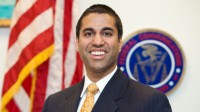FCC chair Ajit Pai has put forth a plan to prevent cities and towns from regulating Internet access via their authority over cable TV networks and limit how much cities can charge cable companies. The cable industry has long lobbied for these changes; Pai’s proposal will come to a vote at the FCC on August 1. Pai’s proposal states that “some states and localities” are collecting fees and imposing requirements not “explicitly allowed” by Title VI, the cable regulation section Congress added to the Cable Act of 1984.
Ars Technica reports that “cities and towns have been fighting FCC attempts to limit their authority over cable networks for more than a decade.” Pai’s proposal will “prohibit LFAs [local franchising authorities] from using their video franchising authority to regulate most non-cable services, including broadband Internet service, offered over cable systems by incumbent cable operators.”

Pai pointed the likely precedent of the situation as the Supreme Court of Oregon decision in City of Eugene v. Comcast, which “upheld a local franchising authority’s imposition of an additional 7 percent ‘telecommunications’ license fee on the provision of broadband services over a franchised cable system with mixed-use facilities.”
Pai’s proposal does away with the decision by “expressly preempt[ing] any state or local requirement, whether or not imposed by a franchising authority, that would impose obligations on franchised cable operators beyond what Title VI allows.” His reasoning rests on Section 622, which limits local authorities to collecting no more than 5 percent of a cable operator’s gross revenue in any 12-month period; Pai states that “the majority of courts … have interpreted section 622(b) to prohibit states and localities from charging fees that exceed those expressly permitted by Title VI.”
The proposal also dictates that any “in-kind” contributions count towards that 5 percent cap, “with limited exceptions, including an exemption for certain capital costs related to public, educational, and governmental access (PEG) channels.”
Public Knowledge, a consumer advocacy group, argued that “the FCC can’t preempt local broadband regulations because the Pai-led FCC gave up its own authority over broadband … when it reclassified broadband as an information service as part of its repeal of net neutrality rules.”
The group, which wrote a filing in November 2018 to urge the FCC to drop the proposal, added that “the FCC cannot regulate or preempt local regulation of any service that does not fall within its Title II jurisdiction over common carrier services or its Title I jurisdiction over matters ‘incidental’ to communication by wire.” Public Knowledge’s argument is “the same one used by state attorneys general and other litigants against the FCC’s attempt to preempt state-level net neutrality rules.”
The U.S. Court of Appeals for the District of Columbia circuit is already considering litigation on the topic and “could issue a ruling at any time,” which “could affect any future appeals of Pai’s new preemption plan.” But the FCC already voted to “kill part of a San Francisco ordinance that promotes broadband competition in apartment buildings and other multi-tenant structures” and “also preempted about $2 billion worth of local fees charged to wireless carriers for placing equipment on public rights-of-way.”

No Comments Yet
You can be the first to comment!
Sorry, comments for this entry are closed at this time.